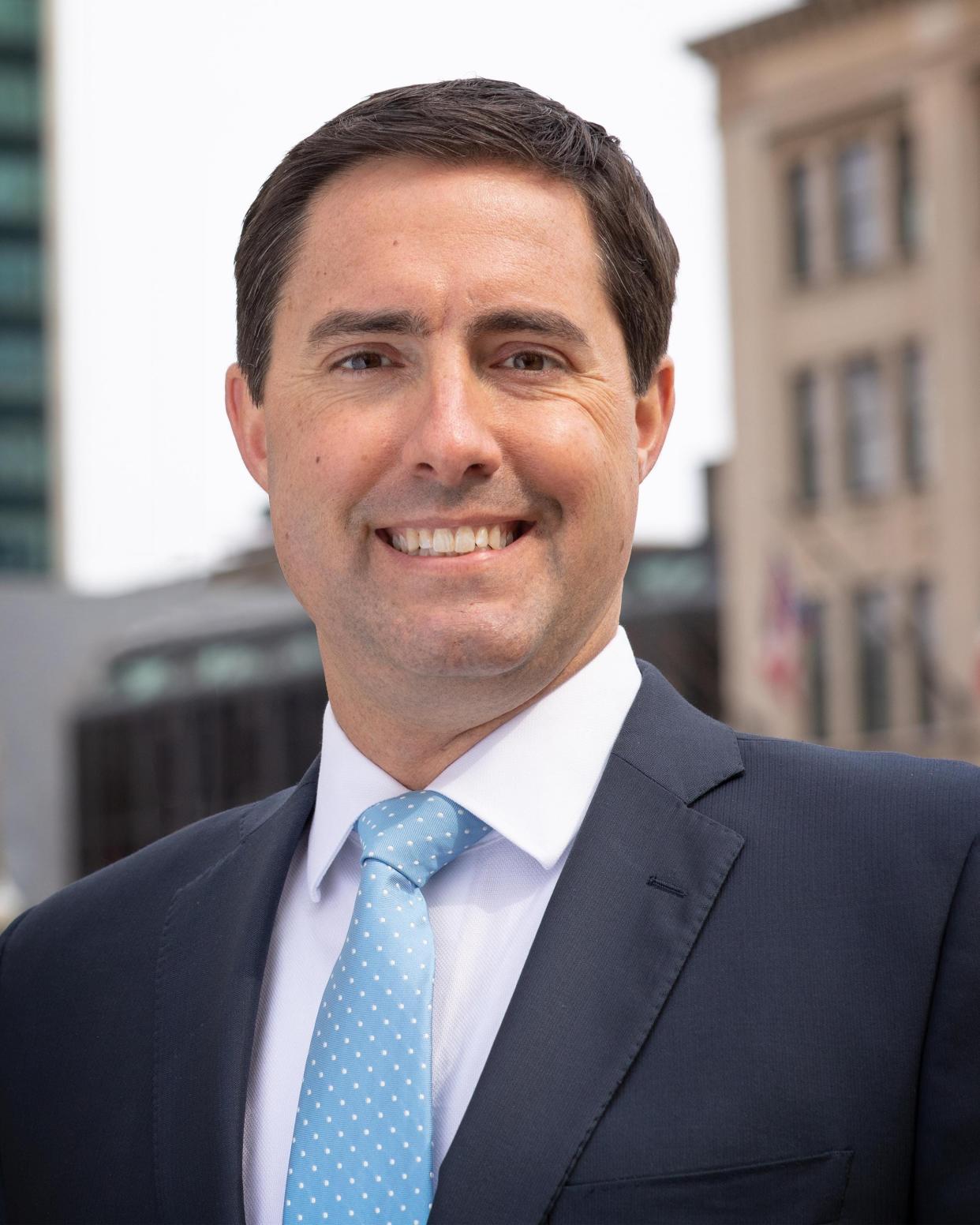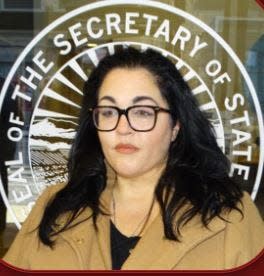Who is running for Ohio Secretary of State?

- Oops!Something went wrong.Please try again later.
- Oops!Something went wrong.Please try again later.
Ohioans will select their next chief elections officer this November, and over the next four years, the winner will play a key role as the state chooses ballot language, candidates and potentially a new president.
"In this atmosphere − probably more so than ever before − it matters that we have a secretary of state who puts the constitution and the law first rather than personalities and preferences," University of Cincinnati Professor David Niven said.
Ohio's 88 boards of election are divided equally between the two major political parties. Each one has two Democrats and two Republicans on its board. Whenever there's a split on what to do (like whether to let a candidate on the ballot or how to spend some money) the secretary of state breaks the tie.
And he or she approves the wording for statewide ballot issues.
The next person to hold this office will likely decide on the wording for an amendment to legalize recreational marijuana and protect access to abortion, Niven said. "Who sits in this office matters."
Currently, Republican Secretary of State Frank LaRose has the job. The northeast Ohio native is a former state senator, a U.S. Army veteran, and the father to three daughters.
LaRose, 43, has two challengers this cycle, Democrat Chelsea Clark and independent candidate Terpsehore (Tore) Maras.
Clark, 37, is a small business owner from the Cincinnati area who served on the Forest Park City Council. She's also a single mom and the founder of an education non-profit that helps children learn math and science.
Maras, 44, runs her own podcast called the Tore Says Show. She's also a military veteran who worked for the intelligence community, a single mother of two girls and an entrepreneur.
To help Ohioans decide who deserves their votes, we asked all the candidates the same questions. Here are their answers:
Where do you stand on former President Donald Trump's allegations of fraud in the 2020 election?
Clark: "They’ve been discredited time and time again. There is no evidence of widespread voter fraud, and he's just a sore loser."

LaRose: "I don’t think there is anything wrong with raising concerns about the way elections are administered," LaRose said. But he thinks mistakes were made in other states and not Ohio.
His office referred 27 potential voter fraud cases from the 2020 election. That's about 0.0005% of the 5.9 million votes cast that year.
When asked what went wrong in other states, LaRose said some of them potentially broke their own laws by mailing ballots to all residents. They failed to prepare for or pre-process those mail ballots. And they entertained "last minute lawsuits" that changed how they ran their elections.
Maras: "As someone who has successfully overthrown governments in 45 countries using elections, his statements are merit-ful."
But election fraud isn't new. "It's been ongoing for decades. In 2004, the Republicans were caught stealing the Ohio election from the Democrats. It's not new. It's been ongoing," she said.
In 2005, the national Democratic Party investigated how Ohio ran its 2004 election. Officials said the "system failed the citizens of Ohio" generally and Black voters in particular but concluded there was no evidence of fraud.
Did President Joe Biden win the 2020 election?
Clark: "Yes."
LaRose: "The 2020 election is over. The results of that election are known and clear that the winner of that election was President Biden," the secretary said during a subsequent interview with reporters about his new plan to hire election investigators for a public integrity division.
The 2020 election fact check:Joe Biden legally won presidential election, despite persistent contrary claims
Maras: "We can't really know that, but if you ask me and just by looking at the population and what position they were in, I would say that Donald Trump won and by a landslide."
Is voter fraud a serious problem in Ohio? A prevalent one?
Clark: "Voter fraud is not prevalent, but any degree of voter fraud should be taken seriously."
Ohio and other states are over-reacting to fears of voter fraud and trying to enact "extreme policies that are kicking folks out of this process. Our job should be first in protecting the rights of voters...Republicans are trying to fix something that is not a problem."
LaRose: The former Green Beret said voter fraud falls into a risk assessment category the military would call "very serious but very rare."
A single fraudulent vote can change the outcome of a local election, LaRose said. "Last year in Stark County, we had a mayor’s race determined by a coin flip because it was a tie."
Maras: "A lot of people keep dismissing it because Donald Trump won Ohio. But it's not just the presidential seats. We're talking school boards, city councils."
She says there's a lack of transparency in the process, particularly when it comes to how computer systems tally votes. "If you and I wanted to inspect the counting of the ballots, we can't. It's propriety, and we should just trust them."
Should Ohioans feel secure in the state's election integrity?

Clark: "Yes, absolutely. There is no evidence of widespread voter fraud in the State of Ohio."
LaRose: "One hundred present without hesitation. Everything that's done in elections (opening mail ballots, verifying signatures, testing voting machines) is observed by both a Republican and a Democrat."
Ohio also has a paper record of every vote. "There is no such thing as a purely electronic vote in Ohio, and we audit every election." He invited anyone with concerns about election integrity to sign up to be a poll worker for November and "get a great education in how our process works."
Maras: "Oh no. How do you feel secure when your government says just trust us?...There's no confidence in our elections because there is no transparency."
What is your opinion on ballot drop boxes? How should they be used?
Clark: "Secured ballot drop boxes are necessary, and they should be used throughout every county. I don’t think we should be limiting them."
Easy access to these boxes wouldn't just help urban voters but rural Ohioans too because their board of election can be 45 minutes from their homes. "It creates an obstacle for working-class families to participate."
She opposes an election reform bill pushed by Rep. Bill Seitz, R-Green Township, that would limit drop boxes to a single location outside each county's board of election.
LaRose: "They are a convenience that Ohioans have the ability to use, but the best way to return an absentee ballot has always been and will continue to be to mail it in."
He supported requiring 24-hour security cameras on all ballot boxes and doesn't think adding more would necessarily increase turnout. If people worry about their ballot being counted, "Ohioans have the ability to track their absentee ballot (online) once they mail it in."
Maras: "I don't think drop boxes are good and here's the reason: The ballots themselves are not secure."
If Ohio made it harder to counterfeit ballots, Maras said she would feel comfortable with drop boxes.
Should Ohioans need a photo ID to vote? And if so, should that ID be attainable at little to no cost?
Clark: "I do believe photo IDs are a great way of making sure our process is accurate in terms of who is coming," she said. "I don’t think we should penalize poor people, however, in additional costs."
LaRose: "Anything that costs someone money would be an unconstitutional poll tax." But 98% of Ohioans already show ID when they vote. "If you have lost your ID, or if you don’t have one, you can use an alternative. That’s very uncommon for people to do that."
Maras: "If we're demanding people show ID, we need to make it free and be making sure we jump through hoops to help them get it."
What, if anything, should Ohio change about the way it runs elections?
Clark: "My opponent favors party friends over actual Ohio voters. He bends the law when he sees fit to do so."
She pointed to how LaRose sided with the two Republicans on Athens County's Board of Elections to keep Democrat Tanya Conrath off the ballot for an Ohio House seat in November 2022.
Conrath wanted to replace the Democrat who won the August primary, but LaRose said the law didn't allow a replacement. The Ohio Supreme Court later added Conrath to the ballot.
She also wants an automatic system that registers teenagers when they turn 18 and to eliminate "unnecessary voter purges" which she says unfairly target communities of color.
"This is about making sure that things are fair," Clark said. "This office isn't red or blue. It's red, white and blue."
LaRose: He wants to continue streamlining how his office maintains voter rolls. Ohio updates its official list when it receives changes of address from the U.S. Postal Service, but LaRose can't immediately remove people who moved out of state.
"When someone is moving to another state, their focus is not on removing themselves from Ohio's voter rolls," he said. "Give my office the ability to remove you once we verify you live in another state."
He also wants the Bureau of Motor Vehicles to electronically process voter registrations instead of asking folks to fill out paper forms.
Maras: "No machine counting." Maras wants to hire enough people during the election season to have teams of three people verify each and every ballot. The counting would also be live-streamed so people could watch from home. And Ohio's ballots would get several upgrades to make counterfeiting them harder.
"We will make it as transparent as possible and as inclusive as possible."
The Secretary of State gets a seat on Ohio's redistricting commission. How would you serve in that role?
Clark: "Mr. LaRose right now is practicing extremism. So much so that he is even going against the Republican Chief Justice of Ohio's Supreme Court on redistricting. I will actually abide by the law and not be afraid to do the will of Ohioans. That’s not what we are seeing right now."
LaRose: The USA Today Network Ohio Bureau reached out to LaRose's campaign after his initial interview to ask this question, and a campaign spokesperson declined to answer.
Maras: "I am totally against what they have been doing. I live in downtown Cleveland, so tell me what my needs have to do with Akron? Absolutely nothing. It makes absolutely no sense, and it's done to favor either Democrats or Republicans."
Where do you stand on State Issue 2?
This proposed amendment to Ohio's constitution would prohibit people who live in Ohio but aren't U.S. citizens from voting in local elections.
Clark: "Yes, I do think only citizens should vote. The job of Secretary of State is to administer election law fairly and without partisanship," Clark said. "I am concerned that when you restrict voting eligibility through Constitutional referendums like this, given our Nations' past history with Jim Crow laws and majority manipulation of voting patterns, there is a slippery slope should future restrictive voting eligibility be presented this way."
What is State Issue 2? Ohioans to decide on noncitizens' voting rights
LaRose: "This is something I feel passionate about, and it actually came out of an experience we had in this office."
In 2020, Yellow Springs approved a change to its charter letting non-citizens vote in local elections. LaRose ordered them to stop, saying it could “undermine the constitution.” But, as it turns out, "the law isn’t clear as it relates to non-citizens voting in these elections," he said. New York City recently let permanent legal residents and other non-citizens vote in its mayoral election.
LaRose wants to make it clear that in Ohio "voting should only be available to U.S. citizens."
Maras: "I lived in England for almost a decade, does that mean I had a right to vote there? No. I was simply living and working there. You have to draw that line. It's not racist or anything. It's common sense."
Anna Staver is a reporter for the USA TODAY Network Ohio Bureau, which serves the Columbus Dispatch, Cincinnati Enquirer, Akron Beacon Journal and 18 other affiliated news organizations across Ohio.
This article originally appeared on The Columbus Dispatch: Who is running to be Ohio's secretary of state?

